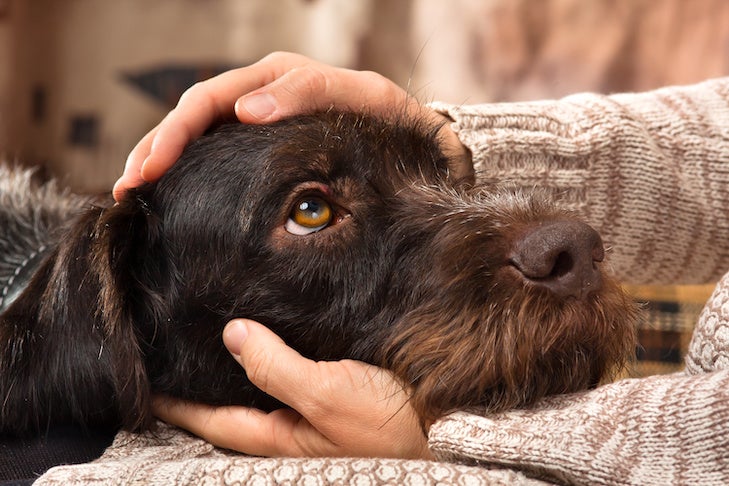Dogs owners know that dogs are great judges of character. If your dog likes somebody, you probably will too. But how about trustworthiness? Can dogs detect sincerity or can you lie to them with ease? If you’ve ever faked out your dog with pretend tosses of their toy or an imaginary treat in your hand, you might think your dog will believe anything. But a new study published in Proceedings of the Royal Society B shows that dogs might be capable lie detectors.
Pick a Bucket
To explore dog lie detection, researchers from the Clever Dog Lab in Vienna asked 260 purebred dogs from various breeds to choose between two opaque buckets. Although both buckets were dusted with food so they would smell equally stinky, only one bucket contained a piece of food. The chance of getting the food would be fifty-fifty, but the dogs weren’t choosing blindly.
One person unknown to the dog, the communicator, would tell the dogs which bucket to pick. They would crouch near a bucket, pick it up, and gaze back and forth between the dog and the bucket while saying, “Look, this is good, this is very good.” During the training phase of the experiment, they always indicated the correct bucket to teach the dog the procedure.
After three training trials, it was time to test the dogs. But now the communicator misled the dogs about the location of the food by indicating the empty bucket. This was done with the help of a second person unknown to the dog, the hider. The hider would place the food in the first bucket in full view of the communicator and the dog. Then they would move the food to the second bucket. Sometimes they would move the food in full view of the dog and the communicator and sometimes they would move the food while the communicator was out of the room so only the dog saw. Then, in both situations, the communicator would indicate the empty bucket and the dog was free to choose.
Dogs Trust Their Own Eyes
The research team expected the dogs to follow the communicator’s hints more often when the communicator saw the switch than when the communicator was out of the room. That’s what primates and children under five do. Rather than follow their own observations, they follow the advice of the liar. However, much to the experimenters’ surprise, the dogs did the opposite.
Around half of the dogs followed the communicator’s advice and chose the empty bucket if the communicator had been out of the room. They may have realized the communicator didn’t know where the food was located, so there was no point in paying attention to their advice. Even more fascinating, only 29 percent of the dogs chose the empty bucket when the communicator saw the switch. This implies the dogs knew the communicator was lying to them. The dogs seemed to trust their own eyes over the advice of the human experimenter.

Breed Differences in Lie Detection
When they were analyzing their data, the researchers noticed a difference in behavior between breed groups. Unlike the other breeds, terriers showed the opposite pattern. They followed the communicator’s advice more often when the communicator saw the switch than when the communicator did not. The scientists wondered if it was due to the personalities of the different breeds. Would dogs bred for independence perform differently than dogs bred to work cooperatively with humans?
To explore this further, they repeated the experiment with Border Collies (to represent cooperative breeds) and 14 different breeds from the Terrier Group (to represent the independent breeds). Sure enough, the two groups showed opposite behavior. The Border Collies showed the same results as seen in the initial experiment, with more of them choosing the empty bucket when the communicator didn’t see the switch. Whereas the terriers performed like young children and primates. More of them chose the empty bucket if the communicator saw the switch.
The researchers theorized that these breed differences might indicate different interpretations of the communicator’s intentions. The cooperative breeds like the Border Collies might have seen the communicator’s advice as deceitful. Whereas the terriers might have interpreted the communicator’s encouragement to choose the empty bucket as the intention to show them something new. It may be that as we bred dogs for cooperative work, we made them more skilled at identifying human deception. The study suggests further research with other independent breeds like sled dogs and hounds would help shed light on this cognitive difference between breeds.
Sophisticated Cognition
The researchers concluded that dogs can judge the information presented by humans based on what those humans have or have not seen. This strengthens the argument that dogs can distinguish between different human knowledge states. For a dog to know you’re lying, they need to have a sense of your mental state. In other words, they need to know what you know. That’s a sophisticated cognitive skill and for years the ability to attribute false beliefs to others was considered something only humans could do.
But dogs have been sharing their social environment with humans for at least 14,000 years. Could it be that this has led to dogs’ ability to read deception? Or did it evolve earlier than that? The researchers suggest future studies should explore how wolves handle this same test to see if domestication is responsible.
Of course, this study was done with humans who were previously unknown to the dogs, not with the dogs’ owners. Would the dogs have trusted their beloved owners more? Would they have given them the benefit of the doubt even if their eyes said otherwise? Regardless, it seems likely that dogs can tell when you’re lying. So next time you do that fake throw of the ball, remember you might be eroding your dog’s trust.

